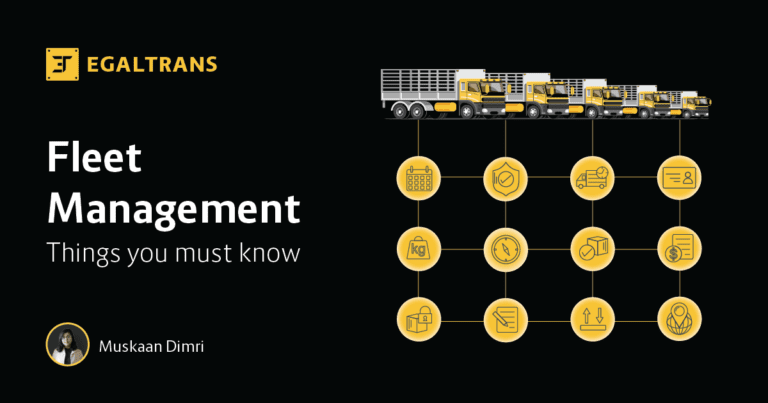To operate a logistics business might sound easy but handling every entity with utmost care and resilience is a very difficult task. Handling shipper-carrier tussles, payment negotiation with truck drivers, maintaining accurate fleet records, driver availability, etc, are the everyday challenges faced by a trucking company and a well-known expectation in logistics industry.
In an ideal scenario, the relationship between truckers, drivers, and shippers should be symbiotic i.e, a close-term interaction that is mutual to every party. The supply chain from truck owners to drivers and then finally to shippers must work together to keep our economy strong and for easier transportation of essential goods.
Challenges Faced by Truck Owners, Drivers and Shippers
- Truck Owners: They are the major stakeholders of the logistics industry supply chain as they create a link between the shippers and the truck drivers. Their main goal is to provide quality service, all-time visibility of their shipments, and maintaining a good rapport with the truck drivers both professionally and personally. A truck owner faces day-to-day challenges such as timely assigning drivers to shipments, paying them sufficiently by also keeping note of various factors such as fuel prices, tax prices, etc. this leaves them with a minimum cost to maintain monthly, irrespective of how much business they get.
- Truck Drivers: They are the backbone of the transportation business. Truck drivers have a challenging lifestyle where they have to fend for their families, educate their children, and maintain a happy & healthy lifestyle. They have constant pressure from both sides i.e, from the fleet owners and the shipment companies. All shipping company processes are interconnected. Therefore, if drivers are not properly managed, other areas of operation will fail as a result. A well-managed fleet improves performance, reduces costs, and increases overall productivity.
- Shippers: Delayed shipments, unclear order status, and stolen goods are some of the more common problems for shippers. A secure supply chain requires high-speed information flow. Shipment status information is essential for shippers to avoid and prepare for unwanted and unpleasant situations. They are heavily dependent on the truck drivers for timely dispatch and hence share a critical role in the logistics supply chain.
Strategic Collaboration in Logistics Industry
A trucking company is profitable, efficient, and productive. The shipper makes a profit when the package is delivered. To reduce tension and increase productivity, shippers have carriers examine their loading and unloading processes to find ways to reduce or eliminate wasted steps and time to improve their supply chain. Frequent communication is the goal of these relationships. A Truck Owner-Driver relationship is the most important one, bridging the trust gap between these 2 parties is the only key to a successful business or a shipment.

Ways in which Trust Gap can be Shortened b/w Truck Owners, Drivers, and Shippers
- Defining ‘urgent’ and ‘Important’:
It is essential to define what might be urgent and what might be important. For eg, a certain shipment of footwear is important but not urgent, but on the other hand, the shipment of a batch of medicine is urgent and should be prioritized immediately. By prioritizing your shipments, you can align your supply chain and make it more efficient by cutting out the “everything should be done yesterday” phrase. Hence the shippers should know their priorities and then only ask the truck owners and drivers the same.
- Mending the Communication Gap:
Recognizing the needs and goals of the other party facilitates productive negotiations and helps manage expectations. Communication is the most important tool to bring out your needs and expectations from the other party.
- Shipping Forecasts to Trucking Companies:
The truck owners need to inform their drivers beforehand that a particular shipment is to be shipped the next day. This helps in avoiding chaos and hassles which could make them look unprofessional in front of their clients. The trucking industry is familiar with logistics. With the help of forecasting, shippers should hence ensure that their requirements and needs are met without communication breakdowns or strained professional relationships.
- Maintaining Business Sustainability:
The most important thing fleet owners need to remember when building their fleet and driver investments is that it should be a sustainable, continuous process that can adapt to changing conditions and new requirements. Driver trust is much easier to break than it is to earn. Hence, it becomes more important to maintain good business relations that are long-term and profitable.

Logistics management is not an easy business as it involves many moving parts and processes to manage it effectively. Good management leads to more successful and motivated teams. Poor management leads to chaos and decreased productivity. Every process in the transportation business is interconnected. Therefore, if drivers are not properly managed, shippers do not pay on time and truck owners are not capable of managing fleets then other areas of operation will fail as a result. Proper fleet management improves performance, saves costs, and improves overall productivity.
Truck Owners, Drivers, and Shippers are the major stakeholders of the transportation businesses and have their challenges as discussed above. If the relationship between them is not equitable then the entire logistics supply chain gets disrupted. With cooperation and management, the 3 of them can get over supply-chain challenges and earn a better lifestyle.





